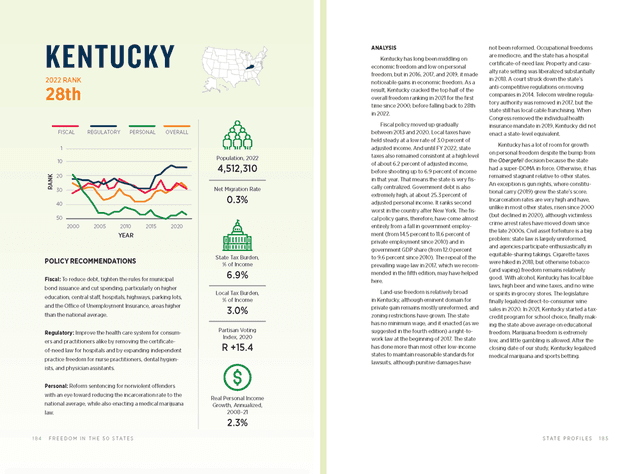Policy Recommendations
- Fiscal To reduce debt, tighten the rules for municipal bond issuance and cut spending, particularly on higher education, central staff, hospitals, highways, parking lots, and the Office of Unemployment Insurance, areas higher than the national average.
- Regulatory Improve the health care system for consumers and practitioners alike by removing the certificate-of-need law for hospitals and by expanding independent practice freedom for nurse practitioners, dental hygienists, and physician assistants.
- Personal Reform sentencing for nonviolent offenders with an eye toward reducing the incarceration rate to the national average, while also enacting a medical marijuana law.
Analysis
Kentucky has long been middling on economic freedom and low on personal freedom, but in 2016, 2017, and 2019, it made noticeable gains in economic freedom. As a result, Kentucky cracked the top half of the overall freedom ranking in 2021 for the first time since 2000, before falling back to 28th in 2022.
Fiscal policy moved up gradually between 2013 and 2020. Local taxes have held steady at a low rate of 3.0 percent of adjusted income. And until FY 2022, state taxes also remained consistent at a high level of about 6.2 percent of adjusted income, before shooting up to 6.9 percent of income in that year. That means the state is very fiscally centralized. Government debt is also extremely high, at about 25.3 percent of adjusted personal income. It ranks second worst in the country after New York. The fiscal policy gains, therefore, have come almost entirely from a fall in government employment (from 14.5 percent to 11.6 percent of private employment since 2010) and in government GDP share (from 12.0 percent to 9.6 percent since 2010). The repeal of the prevailing wage law in 2017, which we recommended in the fifth edition, may have helped here.
Land-use freedom is relatively broad in Kentucky, although eminent domain for private gain remains mostly unreformed, and zoning restrictions have grown. The state has no minimum wage, and it enacted (as we suggested in the fourth edition) a right-to-work law at the beginning of 2017. The state has done more than most other low-income states to maintain reasonable standards for lawsuits, although punitive damages have not been reformed. Occupational freedoms are mediocre, and the state has a hospital certificate-of-need law. Property and casualty rate setting was liberalized substantially in 2018. A court struck down the state’s anti-competitive regulations on moving companies in 2014. Telecom wireline regulatory authority was removed in 2017, but the state still has local cable franchising. When Congress removed the individual health insurance mandate in 2019, Kentucky did not enact a state-level equivalent.
Kentucky has a lot of room for growth on personal freedom despite the bump from the Obergefell decision because the state had a super-DOMA in force. Otherwise, it has remained stagnant relative to other states. An exception is gun rights, where constitutional carry (2019) grew the state’s score. Incarceration rates are very high and have, unlike in most other states, risen since 2000 (but declined in 2020), although victimless crime arrest rates have moved down since the late 2000s. Civil asset forfeiture is a big problem: state law is largely unreformed, and agencies participate enthusiastically in equitable-sharing takings. Cigarette taxes were hiked in 2018, but otherwise tobacco (and vaping) freedom remains relatively good. With alcohol, Kentucky has local blue laws, high beer and wine taxes, and no wine or spirits in grocery stores. The legislature finally legalized direct-to-consumer wine sales in 2020. In 2021, Kentucky started a tax-credit program for school choice, finally making the state above average on educational freedom. Marijuana freedom is extremely low, and little gambling is allowed. After the closing date of our study, Kentucky legalized medical marijuana and sports betting.

